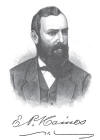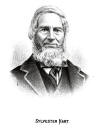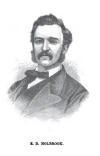|
BIOGRAPHIES
HISTORY
OF
LORAIN COUNTY
OHIO
With
Illustrations & Biographical Sketches
of
Some of Its Prominent Men and Pioneers.
Publ. Philadelphia:
by Williams Brothers
1879
<
CLICK HERE TO RETURN TO 1879 BIOGRAPHICAL
INDEX >
< CLICK HERE TO GO TO LIST
OF BIOGRAPHICAL INDEXES >

E. P. Haines |
ELWOOD P. HAINES
 Source: History of Lorain County, Ohio - Publ.
Philadelphia: William Brothers - 1879 - page 145 Source: History of Lorain County, Ohio - Publ.
Philadelphia: William Brothers - 1879 - page 145 |

Sylvester Hart

|
SYLVESTER
HART. Among the early settlers and
good, practical farmers of Carlisle township who
have passed away, none left a fairer record for
personal integrity and high moral worth than he
whose life and character forms the basis of these
lines. Reared amid the Green Mountains of
Vermont, and at an early period of his existence
being inculcated with the importance of industry and
self-reliance, he was admirably qualified for the
life of a pioneer in the western country where
forty-five years ago he effected a permanent
settlement.
Sylvester Hart was born at Weston, Vt., on the
27th of March, 1806. His father, George
Hart, was a native of March, 806. His
father, George Hart, was a native of
Massachusetts; his mother, Polly Lawrence, a
Vermonter. In the days of his youth,
educational advantages were quite limited and what
little of scholastic learning he obtained was in the
common schools of the place of his birth. By
subsequent self-study, and the application of
knowledge gained by experience, he became a
well-read man, and possessed an intelligence above
the average farmer. It was in the year 1834,
when, imbued with a spirit of adventure, coupled
with the desire to make a home for himself and
family, he came to Lorain Co., Ohio, and settled in
Carlisle township, upon the farm now occupied by his
son, Henry H. Some years prior to his
removal from Vermont, however, he had become pretty
thoroughly acquainted with and habituated in
agricultural pursuits. At the age of seventeen
years he bought his "time" of his father, and
subsequently purchased a small farm, which he sold
preparatory to his departure to Ohio. All went
well with him in his western home until 1840, when
his residence and barn were totally destroyed by
fire, a calamity under which a man of less
indomitable energy and perseverance would have
succumbed. Nothing daunted by this untoward
event, he rebuilt on another part of his farm the
house in which Henry H. Hart now resides.
In December, 1856, Mr. Hart removed to the
village of Oberlin, intending to retire from the
active, incessant labor of the farm. Here he
resided a respected and honorable citizen until his
death, which occurred Sept. 26, 1874.
On the 25th of January, 1829, Mr. Hart was
united in marriage with Relief Baldwin, who
was born in Pawlet, Vt., Aug. 31, 1806. She
survives him. They had issue as follows,
namely:
Relief M., born June 19, 1830; died in infancy.
Eunice D., born July 8, 1831; died in infancy
Jeremiah B., born Aug. 13, 1832; married
Sarah A. Lyon, Jan. 25, 1854. Married,
second time, Julia A. Preston, Apr. 21, 1875.
Children by first wife, - Carlton V., born
May 26, 1855; Alice Relief, born Dec. 22,
1857; and Cora C., born Apr. 11, 1859.
Child by second wife, - Helen A., born Mar.
19, 1876. Elizabeth C., born May 19,
1834; Cornelia M., born Sept. 21, 1836;
married John H. Eckler, of Carlisle, Dec. 25,
1862. Children, - Henry S., born Oct.
11, 1863; George H., born July 20, 1865; died
Oct. 9, 1873; Bertha M., born Oct. 14, 1868;
Catharine M., born May 14, 1872; Frank R., born
Feb. 21, 1875.
Henry H., born Aug. 12, 1840; married Bertha
B. Buehring, Apr. 26, 1861. Children, -
Alice L., born Jan. 6, 1862; Cora R.,
born Mar. 26, 1863; William H., born July
18, 1864; Edith M., born Nov. 25, 1866;
Julia C., born Mar. 7, 1869; Bertha B.,
born Feb. 24, 1872; George M., born Mar. 5,
1874; Edwin R., born May 14, 1876; Flavius
A., born Dec. 2, 1849; married Olive A.,
daughter of Simeon Crane, of Oberlin, Nov.
7, 1877; has one child, Burton S., born
Aug. 30, 1878.
In politics Mr. Hart was formerly a Whig, and
after the organization of the Republican party
affiliated with the latter. He was township
trustee of Carlisle many years, and was elected to
various other offices in that township. He was
not a professor of religion, but the honesty of his
life compared favorably with many of the most ardent
church members. After a careful investigation
of spiritualism, he became convinced of its
genuineness, and espoused its teachings with a faith
that lasted until his death. He became one of
the largest landholders in the county, and was also
extensively engaged in dairying. Those of his
acquaintances and friends by whom he was best known,
generally bear testimony to his uncompromising,
personal integrity, his business rectitude, and the
placidity of his domestic life. It was
in the home circle where the serenity of his
disposition was so highly appreciated. His
benevolence was proverbial. Taken all in all,
the career of Mr. Hart offers many excellent
traits which afford alike a good example for future
generations to follow, and an imperishable legacy to
his estimable family.
 Source: History of Lorain County, Ohio - Publ.
Philadelphia: William Brothers - 1879 - page 184a Source: History of Lorain County, Ohio - Publ.
Philadelphia: William Brothers - 1879 - page 184a |

|
ERASTUS HECOCK
 Source: History of Lorain County, Ohio - Publ.
Philadelphia: William Brothers - 1879 - page
betw. 254, 255 Source: History of Lorain County, Ohio - Publ.
Philadelphia: William Brothers - 1879 - page
betw. 254, 255 |


|
Brownhelm -
JOHN HEYMANN was born in
Nassau, Germany, Aug. 13, 1828. He was the
third son in a family of eight children of George
Heymann. The whole family emigrated to
America in 1848, and settled in Lyme township, Huron
county, Ohio, where they purchased a farm of two
hundred acres, upon which John H. worked
three years. In 1851, he went to California by
way of the Isthmus, where he worked at
blacksmithing, mining and teaming. He remained
there until 1855, when he returned to Lyme township
and purchased a farm, upon which he remained until
1868, when he bought a flouring mill, a saw mill and
other buildings adjoining, situated in Brownhelm
Hollow, on Vermillion river, an illustration of
which mills, etc., is given elsewhere in this
volume. In 1875, he obtained a half interest
in the Amherst flouring mill, and three years later
purchased the other half and became sole proprietor
of it. The mill in Brownhelm Hollow was
destroyed by fire in October, 1876; it was rebuilt
the following year, and is one of the finest mills
in the county. It contains all the modern
improvements, and is capable of turning out as good
grist as any mill within a radius of fifty miles.
In August, 1855, Mr. Heymann and Miss
Katherine Schied were united in marriage.
She was born in Nassau, Germany, Jan. 12, 1832. Her
parents were natives of the same place. She
had three brothers and two sisters, all of whom came
to this country in 1854, and settled in Peru, Huron
county, Ohio, where Mr. Schied bought a farm
of one hundred and seventy-five acres. They
all now live in Huron and Erie counties, except the
father, who is dead.
Mr. and Mrs. Heymann
have had ten children, seven daughters and three
sons, all of whom are living. The oldest son
is married, as is also the oldest daughter.
Mr. Heymann is one of the substantial and
respected men of his township, and enjoys a good
general reputation for industry, honesty and
economy.
 Source
3: History of Lorain County, Ohio - Publ.
Philadelphia: William Brothers - 1879 - page 234 Source
3: History of Lorain County, Ohio - Publ.
Philadelphia: William Brothers - 1879 - page 234 |


|
E. W. HINCKLEY
 Source: History of Lorain County, Ohio - Publ.
Philadelphia: William Brothers - 1879 - page Source: History of Lorain County, Ohio - Publ.
Philadelphia: William Brothers - 1879 - page |

E. D. Holbrook |
EDWIN DORR HOLBROOK.
It is but a labor of love to trace from the earliest
boyhood days the development of those principles
which made prominent the brief but eventful life of
Edwin Dorr Holbrook. He was born in
Elyria, Lorain county, Ohio, Oct. 10, 1835, is a son
of Dexter and Jerusha Holbrook, grandson of
Captain Holbrook and Tyler, who
entered Fort Ticonderoga with Ethan Allen;
also great-grandson of General Seth Pomeroy,
of Bunker Hill fame.
Before scarcely attaining to the dignity of boys'
apparel, while surrounded by his pets upon his
father's farm, the proceeds of his first sale was,
"to buy a new dress for my mother." This was
the key-note of an unselfish life - "not for myself,
but for my mother, to whom I owe so much."
Here he received his rudimentary education, and became
familiar with nature in its various forms studying
the habits of birds, bees and animals; loving
flowers; training and woodbine and wild rose around
the farmhouse; skilled in hunting, skating, boating
and swimming, a knowledge which enabled him to
rescue many from watery graves, once returning
hatless and coatless, after saving King Barton
and a companion. Again, hearing that Mr.
Snow's son was drowning in the presence of a
crowd of anxious friends, he leaped into the swollen
tide. For a time, they believed him lost.
Soon his voice was heard: "Is this the right
direction?" Again he disappeared; again
they believed him drowned, being caught by the death
struggles of the boy, and drawn under; but by almost
superhuman exertion, he bore the lifeless form to
the shore.
This unflinching bravery, daring to face any danger for
the accomplishment of good, characterized the boy as
well as the man. Fun and frolic entered
largely into his composition, and he was the
acknowledged leader in boyish tricks. He was
one of a class of boys who seemed moulded for future
action by that ripe scholar, C. D. B. Mills.
He ever cherished his memory, and, in after years,
expressed the wish that he might travel with him as
his companion. Studied law with his
brother-in-law, Judge T. S. Johnson, and with
Judge Rex, of Wooster; was admitted May 7,
1857; opened an office in Elyria, and continued his
studies, including German. In early life he
was a constant reader; history, poetry, and the
writings of our early statesmen were carefully
studied, as his well worn books evince. His
room at his father's house was filled with books,
papers and speeches, which were very familiar to
him. Born and bred in the democratic faith, he
struggled, even during his minority, for the success
of that party.
June 3, 1861, he bade adieu to home and friends, and
sailed for California, where he remained one year
with his brother, practicing law, when, with
thousands, who in consequence of the overflow of the
Sacramento river and the almost fabulous tales of
the richness of the Salmon river mines, he emigrated
northward a distance of eight hundred miles.
May 16th, 1862, he wrote:
" I start to-morrow astride a mule which carries
myself, bed and provender, off into a wilderness,
over mountains and dangerous mountain streams,
through a country where the red man lies in ambush
to bear my scalp to the maid he loves. But I
am young, have a life before me, and desire making
my fortune as quickly as possible, and to see
something of this country. I only care for
life that I may make you all happy and independent.
If I succeed all is yours - if I fail I want no
mourners."
During the next three years, before the perfect system
of mail communication was established, occasional
letters and rumors reached his home-friends, of
perilous adventure; his narrow escape from a
snow-slide by leaping from his horse, which was
buried under a pitiless sheet of snow and ice; his
traveling over narrow, precipitous mountain
trails to fulfill professional engagements. In
December, 1865, he took his seat as the youngest
member of the thirty-ninth congress. As a
member of congress he labored zealously for the
development of his beloved mountain home - Idaho;
for appropriations for the perfection of mail routes
and roads, for the building of the assay office and
penitentiary; also was ever laboring for the
construction of the Northern Pacific Railroad, in
the interest of which he addressed the capitalists
of Boston. After having faithfully labored for
the development of his territory for two successive
terms in congress, bidding adieu for the last time
to his home and friends, May 26th, 1869, he crossed
for the eighth time the plains to his
mountain home where a demonstration awaited him.
He at once opened a law office at Boise and Idaho
City, and engaged actively in his practice.
Laboring as before for everything pertaining to the
advancement of Idaho, which he hoped would soon
attain to the dignity of a State, in the midst of a
successful professional career, with light hopes of
the future, at the close of the summer day, June
18th, 1870, while resting with his feet upon the
railing in front of his office, which he had
surrounded by forest trees, dreaming his happy
dreams of the future, Charles H. Douglas
lurked behind him and fired a fatal shot. The
wounded man struggled to his feet, attempted to
raise his arm, but aimed too low. He was borne
into his office, where in intense pain he calmly
awaited death saying, "I am not afraid to die, but
want to see my brother before I go. Am glad I
did not hit Douglas when I fired, on account
of his wife and little ones." Asking again if
Theodore had come, for whom a messenger
had been dispatched, he fell into a calm sleep, and
as the Sabbath day dawned his spirit took its
flight.
Marks of respect and tenderness were shown by the
warm-hearted people, and with aching hearts loving
hands consigned him to his resting place. And
while the breezes of his mountain home chant the
requiem above his grave, loving hearts will entwine
and bedew with their tears an imperishable garland
to the memory of Edwin Dorr Holbrook.
 Source: History of Lorain County, Ohio - Publ.
Philadelphia: William Brothers - 1879 - page 146 Source: History of Lorain County, Ohio - Publ.
Philadelphia: William Brothers - 1879 - page 146 |
|
|
DR. JOHN W. HOUGHTON,
of the Wellington Enterprise, is the son of
Asa Houghton, deceased, and Clara Cole
Houghton. He was born in Batavia,
New York, and is now in his forty-fifth year.
He studied two years at the University at Delaware,
Ohio, taught several terms, protracted his classical
course so as to keep up his musical studies parallel
with it, graduating at Baldwin University in 1860,
and from a Cincinnati Medical College the same year.
In 1863 the degree of A. M. in course was conferred
by his Alma Mater.
Soon after graduation
he commenced the practice of his profession at
Wellington, continuing for ten years when he was
obliged to abandon it from impaired health. He
has since devoted his time principally to the drug
and book trade, established some years previously,
until in 1876 he took the additional care and labor
involved in the publishing and editing a weekly
newspaper, in connection with a job office.
 Source
3: History of Lorain County, Ohio - Publ.
Philadelphia: William Brothers - 1879 - page 366 Source
3: History of Lorain County, Ohio - Publ.
Philadelphia: William Brothers - 1879 - page 366 |
 |
Ridgeville, Twp.
MARK HUMPHRY
 Source: History of Lorain County, Ohio - Publ.
Philadelphia: William Brothers - 1879 - facing page
160 Source: History of Lorain County, Ohio - Publ.
Philadelphia: William Brothers - 1879 - facing page
160 |
NOTES: |











